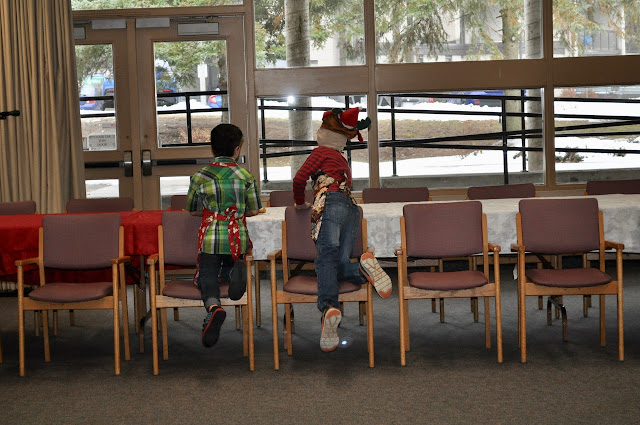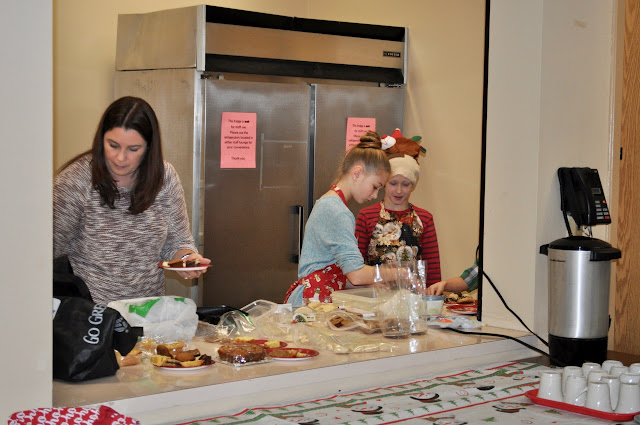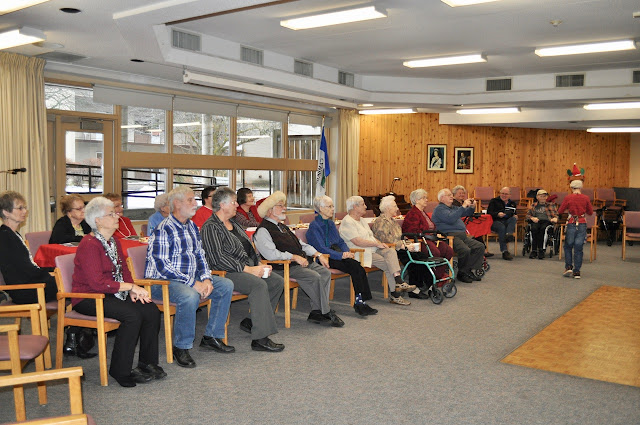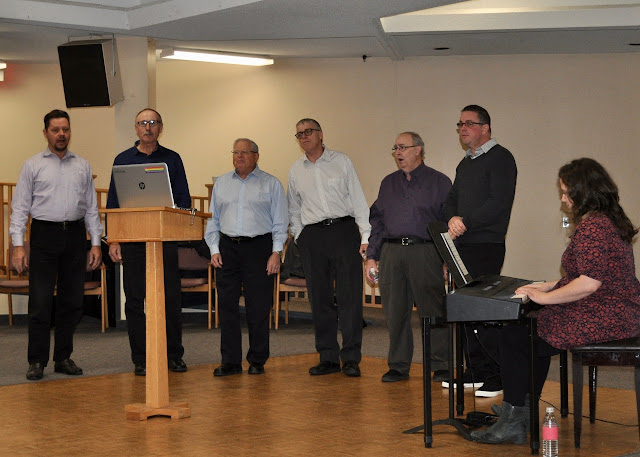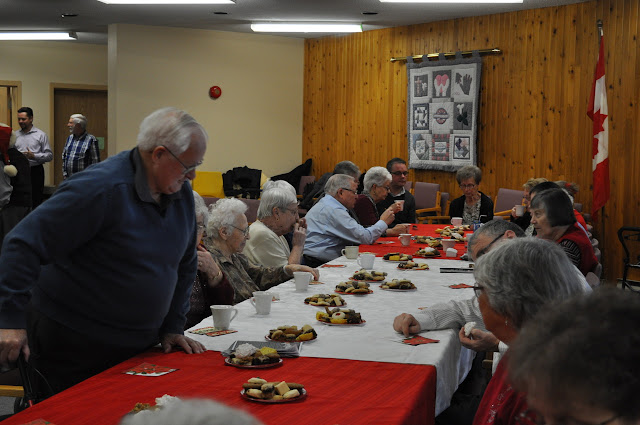Hespeler, 25 November, 2018 © Scott McAndless
Mark 12:41-13:2, 2 Corinthians 9:6-9, Psalm 24:1-10
s you have already heard, this coming Tuesday is Giving Tuesday – a day to celebrate generosity and a day to consider giving generously and in perhaps unusual ways. So I thought a lot about what I should preach on such a day. What does the Bible have to say about giving and giving in extraordinary and even generous ways ?
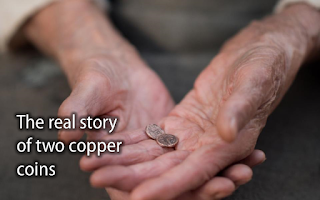
My thoughts were drawn, like so many other preachers before me, to the famous story in the Gospel of Mark. The people are in the temple making their contributions to the temple treasury and Jesus sits down to watch. All of the wealthy people put in enormous amounts of money, but Jesus doesn’t much notice that because they are merely putting in a relatively small portion of their total wealth. But then this widow comes along and she contributes such a small amount, just two copper coins, and at this Jesus sits up and notices. “Truly I tell you, this poor widow has put in more than all those who are contributing to the treasury,” he says. “For all of them have contributed out of their abundance; but she out of her poverty has put in everything she had, all she had to live on.”
The message seems clear enough: Jesus notices when we give, especially when we give generously and sacrificially. So let’s all be like that widow when we support the church. Here endeth the sermon.
But what if I were to tell you that that is not what that story in the gospel is really about. Oh, Jesus was clearly speaking up in favour of that widow; there’s no mistake about that. And Jesus was also clearly in favour of the practice of extreme generosity. He said it often. But that is not quite what this particular story is about. You see, there is one key thing that people miss in the story and that is what Jesus’ mood was.
Jesus was from Galilee and we just happen to know a fair bit about what the mood towards the temple was in Galilee in his time. The Galileans, you see, were being bled dry in Jesus’ day. There were three main culprits. First, there were the rents and fees that the people had to pay to their landlords and masters. Second were the exorbitant taxes imposed by the Romans and by King Herod. But a close third was definitely the Jerusalem temple complex. Jewish Galileans were taxed mercilessly (and some have suggested even more heavily than the Judeans) to support the temple, the lavish lifestyle of the powerful high priests and the ongoing major building projects that continued throughout the lifetime of Jesus. And this taxing (or tithing) was anything but voluntary.
So what do you suppose that Jesus’ mood was as he watched the people place their money in the temple treasury – as he watched a poor old widow put in her very last two coins? I’ll tell you what his mood was, he was mad. So you need to understand that Jesus didn’t say (all sweetly), “Aw, look at that. Truly I tell you, this poor widow has put in more than all those who are contributing to the treasury.” No, he said, (angrily) “Would you look at that! Truly I tell you, this poor widow has put in more than all those who are contributing to the treasury!”
How mad was he? Well, there is another thing that we usually miss in this story. This story comes at the very end of a chapter so we tend to stop reading and put our Bibles down as soon as it is over. But here is a secret that I don’t know if anyone has ever told you before: the verse and chapter divisions were never part of the original text. They weren’t added until centuries later. So the Gospel writer never intended you to stop reading there. The story continues from there.
And what happens next in the story? If you continue into the next chapter, you find Jesus turning around and walking out of the temple. He leaves. This is significant. Jesus is so mad here that he has actually just turned his back on the whole thing. What’s more his disciples all know it because look at how they react. They run after him even as he is leaving and try to stop him. They are worried about his anger. “Look, Teacher,” they say, “what large stones and what large buildings!”
“Come back,” they’re saying, “don’t walk out on the temple, can’t you see how beautiful it is, how big the stones are? I mean, yeah, maybe the cost of running this temple is bleeding the people dry – it’s bleeding that poor widow dry – but isn’t it worth it because… stones?” and what does Jesus say in response to that? “Not one stone will be left here upon another; all will be thrown down.” Not one stone!
How devastating is that? Not only is Jesus saying that the temple institution has taken every last penny from this poor woman to prop up the institution of the temple, he is also announcing that it is a doomed institution. This woman’s contribution has actually been wasted. And, of course, Jesus was absolutely right. About forty years after Jesus said this, in the year 70 AD, and only a few years after all the work on the temple complex had finally been completed, the temple in Jerusalem was completely destroyed.
So, I would suggest to you, that the way we have traditionally read this story of the widow in the temple is actually wrong. And I realize that this might seem like an inconvenient time for me to explain this long-standing error in interpretation – on a day when we are about to launch Giving Tuesday and at a time of the year when, frankly, there is a great need to shore up the financing of this congregation through our giving. It would certainly be easier if today I were able to come out and just encourage us to be that poor widow giving our last two pennies and leave it at that. But, I’m sorry, I am someone who takes the Bible and what it says very seriously. I cannot ignore Jesus’ intended meaning and mood.
But, do you know what? I think we actually have a great need to pay attention to Jesus’ mood in this passage today, because it shows us why it is that we sometimes struggle with money in the church. I would suggest to you that the stewardship message in the church is often exactly the same message that Jesus is reacting to in this passage in the gospel.
How do we often encourage financial stewardship in the church? Well, honestly, our message is often this: the institution is in trouble. I mean look at this beautiful institution, look at these beautiful stones piled up one on top of the other. What about the stones!? And when I say stones, I’m not just talking about this beautiful building, though that is part of it. I’m talking about the entire structure of our church – physical, institutional, and organizational. And our pitch is this: friends, these stones are crumbling. They are in danger of coming down but, with your generous gift of two copper coins or whatever you got, we can shore these stones up for a little while at least. And, friends I don’t think that message is working like it once did.
I don’t say that because I’m trying to repeat Jesus’ dire prophecy, “Do you see these great buildings? Not one stone will be left here upon another; all will be thrown down.” I am not predicting the end of the institutional church; I don’t pretend to have that kind of prophetic insight. Yes, these are times of great change for the church as we have known it, but I do have faith that God will show us the way through and that the Christian gospel and the church that embodies it will continue to go out into the world.
But what I think we are realizing these days in the church is that that was what the mission of the church always was: to embody the gospel. And we have often gotten confused down through the centuries and thought that it was something else – that it was about building institutions (setting beautiful stones one on top of the other). This gospel story has been given to us today to remind us of that.
My prayer and my desire for you today is that you participate in Giving Tuesday. I think it is important that you do so, according to your ability and according to how God has blessed you, because we all need it. The annual orgy of materialism has now begun. The people flocked in their thousands to the malls and stores on Black Friday, often fighting with each other to get what they see as the best deals. Tomorrow, on Cyber Monday, that orgy will continue with online purchases. And that is all good for the retailers and the manufacturers. But how good is it for our society? I suggest that, come Tuesday, it is time for something different – something that is truly good for society: a practice of generosity.
Now, I may hope that you choose to exercise that generosity in the support of this church, but that is not the point of what I’m saying here. Honestly, if God has laid another need on your heart and is directing you to give your generosity in that direction, I rejoice in that and I hope that we can all respond to it by saying, praise the Lord. Of course, I also rejoice if you do give to the church but I also want to say that I don’t want you to give for the reasons we usually offer. I don’t want you to give because we’re behind on our budget. I don’t want you to give because if we don’t get the money to do this or to do that we won’t be able to continue on. I don’t want you to give in order to keep big beautiful stones one on top of the other. All that stuff may be true. We are behind and we always do have needs to fulfil if we are going to keep going, but that is not why I want you to engage in some extra, beyond your regular commitments, giving on this Tuesday or in the weeks to come.
I want you to do it because there is a wonderful opportunity here. You can be a part of something amazing. It may be one of our best kept secrets, but did you know that God is actually present and doing amazing things among all these people here? Here, on a regular basis, they happen. The hungry are fed and parents who have few resources are given food that they can take home to their children. Here, on a regular basis, people who have no decent or warm clothes, are given something to wear and to take to other members of their families. Here troubled people are counselled and encouraged, sometimes by me and sometimes by Sasha who comes in on Tuesdays and works with the Cambridge and North Dumfries counseling service (which charges according to what people can afford to pay). Here people who are lost or discouraged come to hear a word of hope or wisdom or direction and have their spirit lifted through music or through word. Here, on a regular basis, wonderful and even miraculous things do happen. I have people who can tell you stories.
And, yes, I understand that we wouldn’t be able to do all of that and more without maintaining a building and other organizational structures and programs. I understand that we can’t do that without money, I’m just saying that I hope your attitude in giving is that you want to be part of what God is doing and that we not be focussed just on maintaining those structures.
Because you have a remarkable opportunity: you can be part of all that. You can be part of it when you give of your time and talent and your treasure. That’s what Giving Tuesday’s about. It is about being part of something much bigger than yourself – something that God is doing. Don’t give for the sake of stones – whatever those stones may be – give because God is alive and at work. That is what can change the world.
